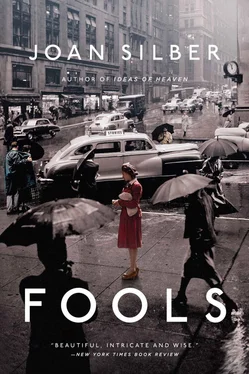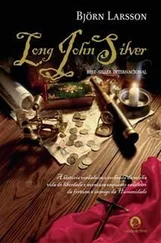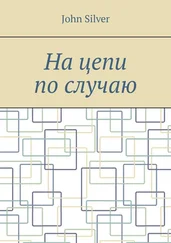My work at the bakery was not very taxing and the hours felt very, very long. I ate too many cupcakes. My mother suggested I bring some of those eternal leftovers to the Catholic Worker place on Chrystie Street, which their friend Dorothy ran. Dorothy wasn’t there most of the time, and the House of Hospitality was full of old winos and young crazies, wacky, life-damaged people, roaming the rooms of an old building, with crucifixes on the walls looking down on all of it. They were exactly the people no one else wanted to bother with. Everybody — staff and residents alike — was thrilled by the boxes of pastries. “It’s Louise!” they would yell, when I walked in the door. One woman jumped around in circles until she had to be calmed by someone.
What did I ever believe? My mother used to say my politics were driven out by my hormones, an insulting version of my history. Serious thought, as well as lust, had made it plain to me that love was truer than all the other weak notions in the world, and that justice could never be served by anything you did (what was the use?), so there was no satisfaction serving it. Now I was in a different spot.
Ted wrote, I wish wish wish you were here . Well, I wasn’t. His contract was for two years, and he had one free trip home in a year. How could I be lost in bedroom fantasies of someone I was so outraged with? At the bakery I had a hazy, distracted look a lot of the time, too much of the time. We were paid very little, and some of the women had families living on this pay. “Wake up, Susie-Q,” they would say to me.
Ted thought I was being “rash and shortsighted” when I moved out of my rent-free home with my family and got a one-room apartment on East Third Street — tub in the kitchen, toilet in the hall. “By yourself?” Ruthie said. “No one else?”
My mother said, “I thought you wanted to save money.”
Nobody thought I was smart, and maybe they were right. But how many months could I stay in my old room with Barbara? I tried very hard to make the new place interesting, I worked on the décor — the one wall painted coral-orange, the poster of Picasso’s Guernica , with its twisted figures. I was not really at home there at first, but I thought that I would be, and I was right. I’d been raised to love freedom (of another sort, but this sort had a meaning) and my pride took me a long way. Sometimes the sight of my own table, where I read whatever I wanted to while I ate, put me in a kind of rapture. No one believed me.
At Thanksgiving, my father took all of us to join a small march downtown in support of the United Auto Workers’ strike at the Kohler steel plant in Wisconsin. My mother brought a thermos of hot cider to make sure Barbara and I stayed warm. The Thanksgiving weather was sunny and not so cold and we knew a lot of the people marching, so it was a fairly festive afternoon. BE WISE, DON’T BUY KOHLER PLUMBING SUPPLIES, my picket sign said.
And how was Ted’s holiday, with his fellow Americans in Japan? Not bad, but he missed me. His voice sounded underwater when he called. He got to go to the Officers’ Club, where they all drank enormous amounts of whiskey and sang “Over the Meadow and Through the Woods” together. A staff sergeant kept imitating a turkey. Gobble, gobble. Yes, yes, I missed him, but I was secretly glad I wasn’t there.
And so it went. We longed for each other in raging fevers and we nursed our resentments. My youth was being wasted, and Ted said he was in exile because of my parents. Clearly he kind of liked his exile. ( Just tried local noodles. With stewed pig’s feet! he wrote. Very tasty! ) To distract myself, I went and took a night course at Hunter College, Love and Money in the Victorian Novel. I was older now and spoke more in class, I had opinions about Becky Thatcher.
Arigato meant “thank you” in Japanese, Ted wrote, and konnichiwa was hello. In the spring Ted was coaching a school softball team. I’d never seen the man play baseball in my life. We stopped squabbling in our phone calls but I didn’t always know what he was talking about. I was friendly with two girls from my class at Hunter and we’d go for tea afterward and have ideas about Rochester’s blindness. And then how nice it was to come back to my room, the stillness at the end of the night. Ted was in my thoughts but it wasn’t so bad being parted. I could tell he felt that too.
“How’d you come up with this?” he said, when he saw my apartment, on his big trip home in August. We’d already embraced long and hard at the door, but he was a little thrown by the coral-orange wall and the desolate sink. “ I like it,” I said. I was still tasting the feel of his mouth, the fresh surprise of it. “I pictured something different,” he said.
But we did very well, in our odd circumstances. Once we got over a few preliminaries in bed, we were back as familiars, lolling in the luxury of actually really having each other. I had forgotten the Ted-ness of sex with him, the specificity of it. All my craving had not been a true memory. How weak the imagination was.
Ted said, “In Japan they take baths at night, they think we’re weird with our showers in the morning.” He enjoyed slipping in these reports. I was curious, but not as curious as he thought. “They eat raw horse meat, not just raw fish, can you believe it?” he said. “But they’re very clean. The base is immaculate.” My friendly imperialist of a husband. I didn’t talk much about school, I didn’t want to hear what he thought he knew about Dickens.
The clock was ticking, we only had two weeks to be happy together. It took concentration, but we did all right. I cried at the airport — I felt so bad for myself — but I said, “Don’t mind me, I’m silly,” as if I really were a soldier’s wife.
At the bakery, one of the older women teased me about those geishas over there and how the smart thing would be to have a little bundle of joy to keep him tied to home. People really said these things? I couldn’t tell her: I love my husband and I don’t . And everybody knows, you can’t be a little bit pregnant.
I’d long since lapsed out of writing letters every day, and in the second year I didn’t always remember every week. When his monthly checks arrived, I’d write, Thank you for your lovely contribution to the ever-popular Louise Likes to Eat Fund . I did need them for the rent. Was this what made us married, that he still sent me money? Sometimes he’d say, I know you can always use it , as if it were extra. I love your taste in checkbook paper , I wrote. The green tint goes with everything .
I had a preposterous flirtation with one of the bakers on the night shift at Mrs. Plymouth’s — he came on during my last hour of work, and sometimes we kidded around in the kitchen. His name was Trevor, he was from Trinidad, and I told him he looked like Harry Belafonte. (He did.) He was very careful around me, but when I complimented him on his way with the dough he gave me an appropriately merry look. My fantasies of him began to block out my fantasies of Ted, which was a peculiar feeling. And what did it matter, if it was all in my head anyway? But one evening I asked Trevor what his days were like, did he sleep all day, and I somehow invited him for supper on Monday, when the bakery was closed.
He dressed so nicely for that dinner, in a pressed shirt of dazzling pale blue, and we talked about the winters in Trinidad—“Oh, yes, gets up past eighty degrees”—over my fried flounder and mashed potatoes. “I like the colors in your house,” he said. “Little, little place but you make it pretty.”
I had to give him a sign — I brushed against him on the way to the stove — and after that it was simple. We were in bed! I’d never thought I would have any other lover but Ted, and I was astonished at myself, even after all the rehearsals in my mind. He was different from Ted — more full of flourishes, and also more jolly and confident. I thought that I was a reckless person but I had chosen a kind man. I can do this , I thought, I’m lucky .
Читать дальше












